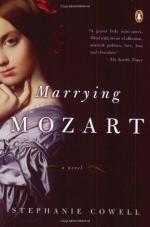
|
| Name: _________________________ | Period: ___________________ |
This test consists of 15 multiple choice questions and 5 short answer questions.
Multiple Choice Questions
1. What quality does Salieri say he requires in a wife?
(a) Ability to bear children.
(b) Lack of fire.
(c) Feistiness.
(d) Musical talent.
2. How does Mozart insult Count Orsini-Rosenberg?
(a) He tells him he looks like a turd.
(b) He tells him he is fat as a toad.
(c) He makes an obscene gesture and laughs.
(d) He tells him he looks like a toad.
3. What causes Mozart to stop his silliness on this occasion?
(a) The mention of his father.
(b) The idea for some new music.
(c) Constanze's annoyance.
(d) Respect for the Baroness.
4. What is the Emperor's judgment of the opera.
(a) 'Too many costumes.'
(b) 'Too many songs.'
(c) 'Too many notes.'
(d) 'Too many high notes.'
5. Who was an influential teacher of Salieri?
(a) Gluck.
(b) Glinka.
(c) Glock.
(d) Monteverdi.
6. What does Salieri say is the effect of the slowness in the music?
(a) Boredom.
(b) Patience.
(c) Opulence.
(d) Serenity.
7. Who picks the child Mozart up after his fall?
(a) No-one.
(b) The Emperor's mother.
(c) Marie Antionette.
(d) His mother.
8. How does Salieri refer to his servants?
(a) As The gossiping Ventrecelli.
(b) As the Kappellmeister's Baker and The Keeper of the Salt.
(c) As The Keeper of the Purse and The Maker of the Cakes.
(d) As The Keeper of the Razor and The Maker of the Cakes.
9. What caused Mozart's death, according to the Venticelli?
(a) Syphilis.
(b) Rheumatic fever.
(c) Puerperal fever.
(d) Smallpox.
10. What is Salieri's reaction to the young couple's goings-on?
(a) He is appalled.
(b) He thinks it is outrageously funny.
(c) He is angry.
(d) He is indifferent.
11. What influences Mozart to make wildly tactless utterings at Bonno's house?
(a) He has been taking laudanum.
(b) He has been listening to Salieri's Venticelli.
(c) Alcohol--he is drunk.
(d) His arrogance.
12. Where has Mozart been living prior to his arrival in Vienna?
(a) Melk.
(b) Prague.
(c) Bonn.
(d) Salzburg.
13. Who prompts the Emperor's response to the opera?
(a) Baron Van Swieten.
(b) Count Orsini-Rosenberg.
(c) The Venticelli.
(d) Salieri.
14. Who plays the 'march of welcome' for Mozart?
(a) Von Strack.
(b) The Emperor.
(c) Count Orsini-Rosenberg.
(d) Salieri.
15. Where is Salieri hidden?
(a) Behind an arras.
(b) Behind the door.
(c) Under a trestle table.
(d) In a wing-backed chair.
Short Answer Questions
1. Which Mozart opera is being performed in this scene?
2. How does Mozart react when the Major-Domo enters?
3. What people are the chorus members meant to represent?
4. Which character receives a kiss from Salieri?
5. How does Mozart defend his work?
|
This section contains 463 words (approx. 2 pages at 300 words per page) |

|




